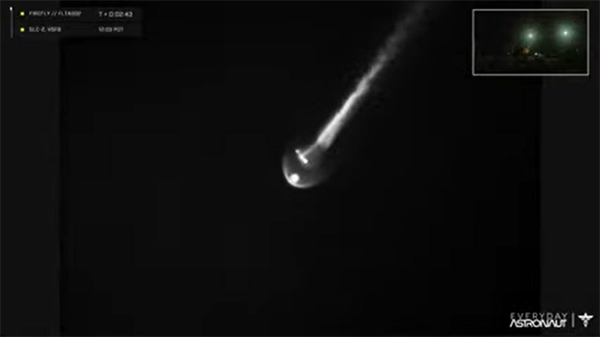
VANDENBERG SPACE FORCE BASE, Calif. (October 1, 2022) — Firefly Aerospace succeeded in launching its Alpha rocket into orbit for the first time during an early-morning launch on Saturday.
Alpha lifted off with eight small satellites aboard from Vandenberg Space Force Base at 12:01 a.m. PDT. Firefly mission control announced the rocket had entered orbit after its second stage shut down.
Mission control experienced an expected loss of signal from the vehicle shortly thereafter as it went out of range of a ground tracking station. Controllers expected to receive data through a tracking station in Hawaii, but no downlink was received. A controller said the problem was likely not with the second stage.
Controllers would have to wait for the second stage to come into range of another tracking station.
Firefly Alpha Launch No. 2 Payloads
| Satellite | Type | Organization(s) | Purpose |
|---|---|---|---|
| TechEdSat-15 (TES-15) | CubeSat | NASA Ames/San Jose State University | Technology demonstration |
| TIS Serenity | CubeSat | Teachers in Space, Inc. | Education |
| PicoBus | PocketQube | Libre Space Foundation | PocketQube deployer |
| FOSSASAT-1B | PocketQube | FOSSA Systems | Technology demonstration |
| GENESIS-L | PocketQube | AMSAT-EA | Amateur radio |
| GENESIS-N | PocketQube | AMSAT-EA | Amateur radio |
| QUBIK-1 | PocketQube | Libre Space Foundation | Technology demonstration |
| QUBIK-2 | PocketQube | Libre Space Foundation | Technology demonstration |
| Firefly capsule | Capsule | Firefly Aerospace | 128 postcards |
The launch came less than 24 hours after Alpha’s first stage engines shut down as they began to ignite.
“The vehicle went into auto abort after ignition. This is designed into the system to ensure safety. The team scrubbed tonight’s launch attempt and is reviewing data to determine our next launch window,” the company tweeted.
Firefly aborted a launch attempt in the final minute on Sept. 11 due to a drop in helium pressure in Alpha’s second stage. Bad weather further delayed the launch until this week.
Alpha failed during its maiden flight in September 2021 after a first-stage engine shut down after liftoff from Vandenberg.
Alpha will be capable of launching 1,170 kg (2,579 lb) to a 200-km (124-mile) high low-Earth orbit (LEO) or 745 kg (1,642 lb) to a 500-km (311-mile) high sun-synchronous orbit (SSO). The company plans to upgrade the booster’s capacity to 860 kg (1,896 lb) to LEO and 1,375 kg (3,031 lb) to SSO in June 2023.

